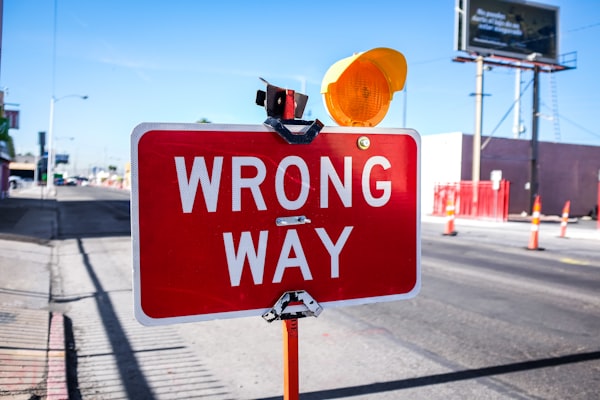Do you know what the difference between a lie and the truth is?
People lie for the short-term benefit at the cost of the long-term, while people tell the truth for the long-term benefit at the cost of the short-term.
Read that again.
It might seem complex, but I promise it isn't. Today, we're breaking down the why behind truths and lies.
Now before we go into the importance of honesty and how to be more honest in your everyday life, it might be helpful to understand why people lie in the first place.
So, let's start with that first.
Save the present, risk the future
Lies are told for a myriad of reasons, but they are most commonly employed for short-term benefits.
Here are some examples:
- To save face or to save someone else from embarrassment or shame. "No, you look great in that dress, it totally suits you!"
- To avoid a potentially stressful or dangerous situation without fully resolving it for good. "I can't go on a date with you tonight. Maybe some other time?"
- To make oneself appear better than one truly is. "Of course I aced the test too. Who didn't?"
Unfortunately, when people employ lies, they take great risks in screwing the future up as a result of their deceit.
Lies only "work" so much, and mostly when: 1. Other people are involved and 2. When the lie isn't exposed to them.
Of course, when the lie is exposed, it won't do either party involved any good. More damage is done than if you were just honest in the first place.
Furthermore, lying to yourself only creates room for invisible damage to creep in. You're delaying a problem that won't be solved until you're honest.
Let's go back to the examples and expand on what I mean:
- If you lie to save someone else from embarrassment or shame, it might make someone feel good in the moment, but you're damaging the trust between you two. You're telling someone what you think they want to hear, and not what you truly believe in. Ask yourself if you want people around you to never give you a straight answer.
- If you lie to avoid a stressful situation, such as feigning interest in someone so you don't have to deal with the consequences of rejecting them, you're just dragging things out. You're leading them on, giving them false hope with the idea that there's a chance to date you. If you just rejected them outright, you wouldn't have to lose sleep thinking about your next excuse to reject them with.
- If you lie to make yourself appear better than you truly are, you're all talk and no walk. It might work on other people, but if and when they call you to step up to the plate, you'll fail in front of them and expose yourself as a fraud. You're not perfect, so get over it and don't act like you are. Own your flaws and work on yourself.
Risk the present, save the future
The present you isn't the only thing you should be thinking about when you're tempted to lie.
As I've outlined already in my previous examples, lies don't fix your problems – they only create new ones or exacerbate the ones you already have.
Sooner or later, you have to face the (uncomfortable) truth that, well, you have to come clean.
Get real with others. Get real with yourself. No one has it all together, and you're no special exception to that rule.
People are so scared of the risk of the truth in the short term.
- "If I tell her that dress doesn't look good on her, she'll hate me and think I'm rude!"
- "If I reject him outright, he'll blow up in my face!"
- "If I admit I didn't do well on the test, I'll be made a fool in front of everyone!"
Sure, you might "risk" your present by presenting an uncomfortable truth to someone, or by coming face-to-face with your inner demons that you've tried to run from for so long, but I promise that in the end:
- The right people in your life who have the capacity for healthy relationships with you will be thankful that you're honest with them.
- The situations that need fixing will die a lot quicker when you stop trying to postpone them with lies.
- The issues that you have that you've tried to bury under the rug will be a lot easier to solve the earlier you tackle them.
Rejecting someone outright doesn't guarantee someone will blow up at you. Admitting that you didn't do well on a test doesn't ensure mockery from others either.
Don't jump to the immediate conclusion that telling the truth is going to lead to the worst possible outcome.
Even if it does, there's no price tag for honesty. Lies are cheap. It takes guts and integrity to be loyal to the truth.
People will value and appreciate you more in the long run when you're honest with them and around them.
How to be more honest
I wasn't always an honest person, but instead of just giving you something to do, I'll start you off with three things you can think about and internalize that will help motivate you to become a more honest person in your everyday life.
- Understand the consequences of not being honest. You can look back at the examples earlier if you need to. Know that when you sacrifice your honesty for a comfortable present, you're not fixing anything or making anything better.
- Think about how you'd feel if you were lied to. Exercising empathy helps solve plenty of problems. If you'd want to be surrounded by people you could trust and count on for an honest take, why would you deny somebody else that?
- Reflect on your reputation and your relationships. If you habitually lie to people, people will come to know you as the one who lies, the fake, the person who can't be trusted. Sooner or later, you will need people who can trust you, and you won't find them building your résumé of lies.
You can take small steps to become a more honest person too. You don't have to jump right in and tell someone that they're ugly to their face. You probably shouldn't do that, anyway.
For instance, start with eliminating the white lies.
Stop saying things just to comfort people when they want your honest opinion. If you don't think a certain color suits them, just say so if they want your thoughts. If they get mad at you for "insulting" them, it's their problem, not yours. You did what they asked.
Slowly but surely, move up to bigger things, like rejecting someone in person if they ask you out and you're not interested in them.
You don't have to look at becoming more honest like an overnight transition, as long as you're consistently building towards it.
One more thing before I close this off.
Honesty promotes authenticity and unfiltered communication.
However...
Making the disclaimer that you are being "brutally honest" does not mean you can be rude to others and expect no repercussions.
Be honest with your words, but deliver the truth in a way that's respectful.
How well-received what you're saying is isn't just about what you're saying.
It's also about how you say it.
It might feel uncomfortable at first, but never forget that honesty makes the world go round.
Humans need to be able to trust each other to work together.
In a world full of lies, you being honest will undoubtedly make you stand out and shine.










Member discussion